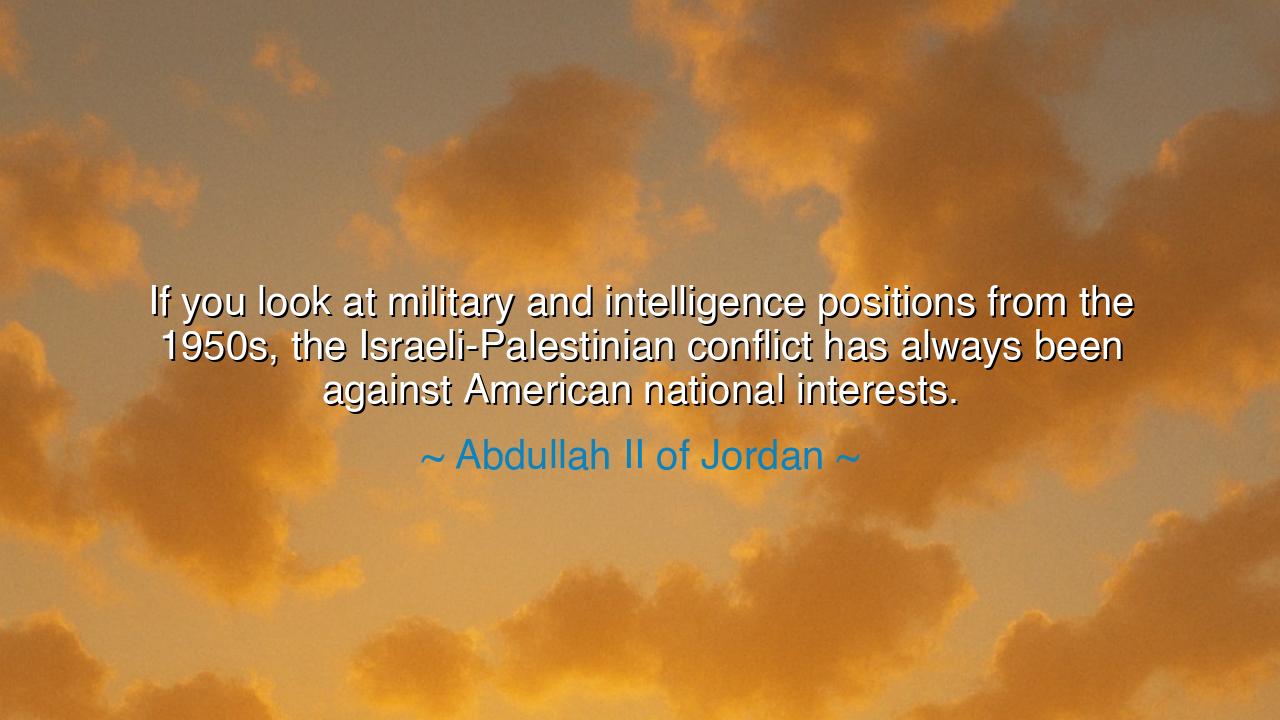
If you look at military and intelligence positions from the
If you look at military and intelligence positions from the 1950s, the Israeli-Palestinian conflict has always been against American national interests.






In the words of Abdullah II of Jordan, "If you look at military and intelligence positions from the 1950s, the Israeli-Palestinian conflict has always been against American national interests," we find a statement that reflects the deep complexities and historical weight of one of the most enduring geopolitical conflicts of modern times. Abdullah II speaks not just of a single conflict, but of a global web of interwoven interests, alliances, and power dynamics. His words suggest that the Israeli-Palestinian conflict has, since its inception, often run counter to what has been perceived as the core interests of America, not just politically but strategically. This insight sheds light on the often uneasy alignment of U.S. foreign policy, regional stability, and long-term peace.
This assertion taps into the ancient wisdom of conflict resolution and the age-old struggle for balance in a world defined by competing interests. The Greeks, in their reflections on war and peace, often emphasized that true strength lay not in the ability to dominate but in the ability to understand and resolve conflict. Thucydides, in his History of the Peloponnesian War, saw war as the result of human passions and the inability of states to align their interests toward mutual benefit. Similarly, Abdullah II recognizes that, for decades, the American support of certain political and military dynamics in the Middle East has perpetuated a conflict that is fundamentally at odds with American national interests, especially regarding the broader goal of peace and stability in the region.
Consider the example of Henry Kissinger, former U.S. Secretary of State, who, during the 1970s, faced the immense challenge of balancing American interests in the Middle East while also attempting to broker peace between Israel and its neighbors. Kissinger’s shuttle diplomacy during the Yom Kippur War of 1973—where he negotiated the disengagement of forces between Israel and Egypt—was driven by an understanding that lasting peace in the region required a delicate balance of military might, political will, and a revised alignment of American policy toward both Israel and the Arab nations. Yet, even with such efforts, Kissinger was well aware that the Israeli-Palestinian conflict, as a core issue, would continue to threaten the broader American interests in the Middle East.
The Israeli-Palestinian conflict has always been a source of tension, not just in the Middle East but across the globe. America's involvement has often been marked by an attempt to mediate between conflicting parties while simultaneously maintaining strong alliances with Israel, which has been seen as a strategic partner in the region. But Abdullah II’s words serve as a stark reminder that this approach has sometimes led to contradictions in U.S. foreign policy. The American national interest, defined by security, stability, and the promotion of peace, is often at odds with the realities of the conflict. The continued occupation and lack of a viable two-state solution for the Israeli and Palestinian peoples present a constant challenge for American diplomats, whose efforts to broker peace are undermined by the deep, unresolved issues at the heart of the conflict.
Consider, too, the example of President Jimmy Carter and the Camp David Accords in 1978. Carter’s negotiations brought together Israeli Prime Minister Menachem Begin and Egyptian President Anwar Sadat, culminating in a historic peace agreement. While this was a monumental step in shifting the course of history, it underscored that true peace in the region requires more than just the resolution of territorial disputes—it requires addressing the humanity and rights of the Palestinian people. Despite Carter’s success in bringing Egypt and Israel to the table, the unresolved issue of Palestine remained an ever-present barrier to lasting peace. This is the essence of Abdullah II’s statement: that the Israeli-Palestinian conflict continues to stand in the way of a more coherent American strategy in the region.
The lesson from Abdullah II’s statement is one of realism and understanding. For generations, the challenge of balancing American interests with the reality of the Israeli-Palestinian conflict has been a difficult, often contradictory endeavor. While Israel remains a close ally of the United States, and American support has been crucial to its security, the continued displacement and suffering of the Palestinian people poses an ethical dilemma for anyone seeking peace in the region. This conflict is not merely a political struggle; it is a deeply human one, touching on issues of justice, human rights, and self-determination. To move forward, America and the world must confront these contradictions and find a way to move beyond the narrow confines of political alignment to address the human cost of the conflict.
In practical terms, we must seek a deeper understanding of the complex and interconnected forces at play in the Israeli-Palestinian conflict. The lesson for us is to not be swayed by partisanship or the simplicity of short-term political gains but to consider the long-term impact of policies on both people and nations. This requires a commitment to listening, to engaging all parties, and to understanding that true peace requires more than just an agreement between states—it requires addressing the deep-rooted grievances, aspirations, and rights of the people who have lived with this conflict for generations. It is only by acknowledging and understanding these layers that we can begin to heal the wounds of the past and move toward a future of justice and lasting peace.






AAdministratorAdministrator
Welcome, honored guests. Please leave a comment, we will respond soon